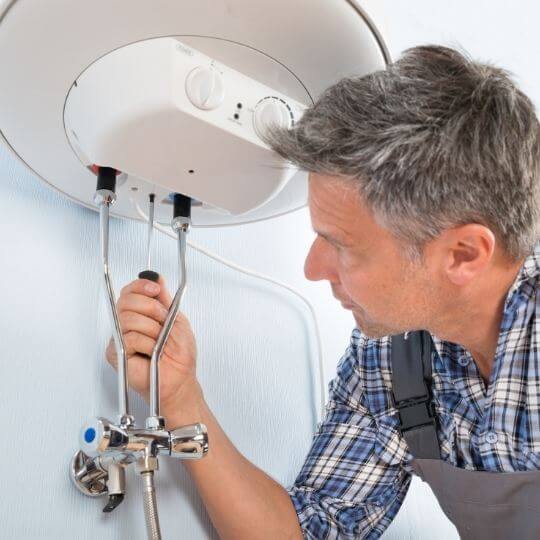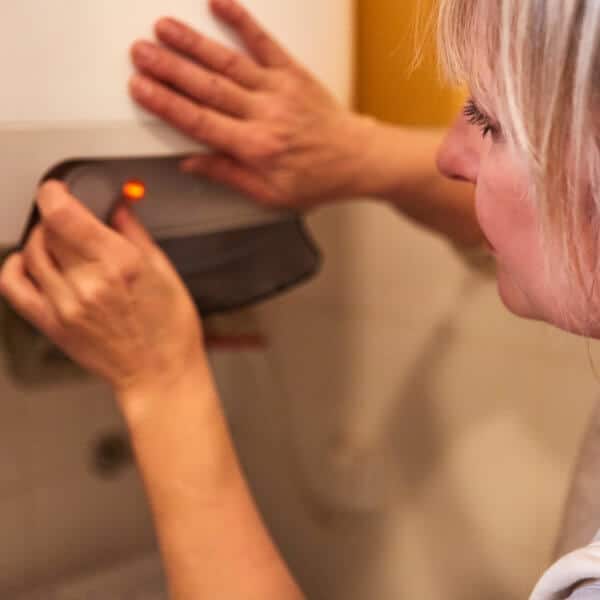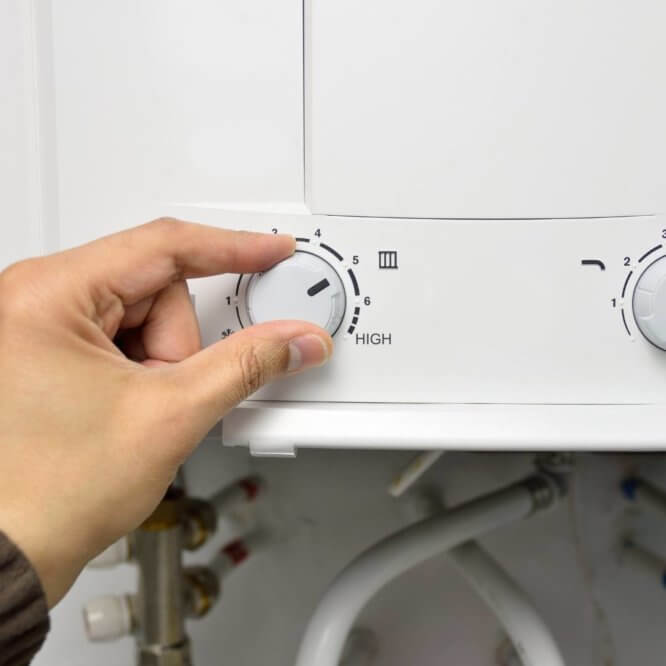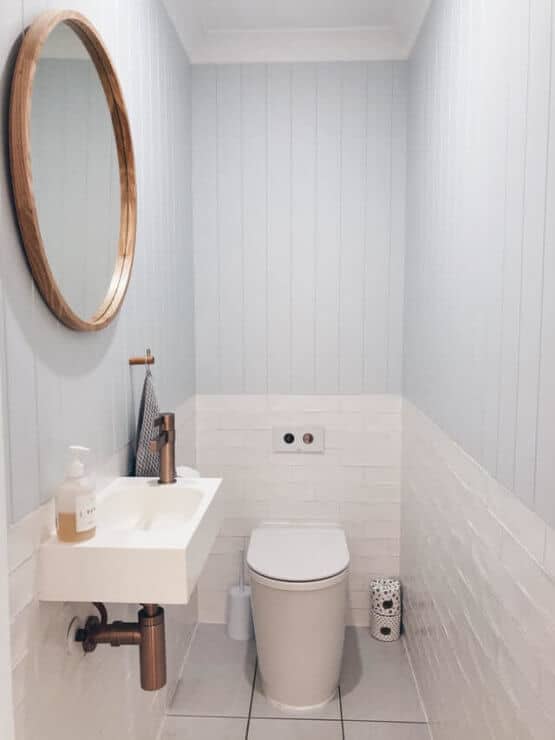For households of two to four people, a 40 gallon water heater is typical. These tanks are commonly found in homes with 1.5 bathrooms. However, you may have a problem if you have a 40-gallon water heater at home that quickly runs out of hot water. Learn how long should a 40 gallon water heater stay hot and why it may be running out of hot water more rapidly than it should.
A 40-gallon water heater that is continuously used should keep hot for about 45 minutes to an hour. However, this quantity is influenced by factors, such as tank insulation and fuel source.[1]
How Long Should a 40 Gallon Water Heater Stay Hot?

Hot water is kept in a tank for instant use in storage water heaters. The water heater needs to replenish and heat the water once it has been drained.
Most of the time, you’ll have about 45 minutes to an hour of uninterrupted use before your hot water supply runs out. This figure, however, is dependent on a variety of circumstances, which are given below.
- Amount of Hot Water Used: The quantity of hot water you use at one time significantly impacts how long your water stays hot. For example, if you run straight hot water, you will run out substantially faster. However, you should run it for around 45 minutes to an hour if you keep the heated water halfway and the cold water halfway.
- Water Pressure/Flow Rate: Some homes have lower water pressure than others. Similarly, specific showerheads allow you to change the water flow. You will lose hot water faster if you select a higher water flow rate than usual. On the other hand, you can save up to 10 gallons for every 10 minutes you spend in the shower by installing a low-flow showerhead.
- Tank Insulation: Depending on how well your tank is insulated, the time your water stays hot can vary. Your water will not be as chilly inside the water heater if your tank is excellent at maintaining the cold air out. This will reduce the amount of effort required by your unit to keep the water hot.
Hot Shower Capacity in a 40-Gallon Water Heater
A regular shower uses 10 gallons of water each time it is used. That means a 40-gallon water heater can provide up to four showers in the same hour on average. If you only utilize hot water in the showers, don’t use it for anything else.
Usually, though, you would use your hot water to wash your hands in the dishwasher, the laundry, or even the bathroom faucets. Unfortunately, all of these activities and equipment can dramatically drain your hot water supply.
If you want to linger in the shower or two people are taking a shower simultaneously, you can only receive two showers.
This is because the number of hot showers you may obtain with a 40-gallon water heater is ultimately determined by how much water you consume in the shower and around your home.
If, on the other hand, you’ve seen a considerable reduction in the quantity of hot water in your showers, your water heater or furnace may be malfunctioning [2].
What Is Water Heater Recovery Time?

The time taken to heat water in the tank after depletion is the recovery rate of your water heater. The time it takes for the water heater to recover is determined by its size and type.
You can deduce two things from the recovery rate. It first states the number quantity of water that can be dispensed by the tank every hour. Second, it specifies how soon the tank will be able to offer you extra hot water after it has been depleted. An ideal recovery rate for a gas water heater would be around 40 gallons per hour or more [3].
Electric water heaters are often less efficient than gas water heaters. A gas water tank will generally provide you with extra hot water within 30 to 90 minutes after all of the hot water has been used up; however, an electric water heater would typically take 1 1/2 to 2 hours to reheat.
These timeframes, however, are also affected by the ambient temperature. For example, your water heater will reheat faster in the summer than it would in the winter. Similarly, if you live in a cold location, your water heater will not reheat as quickly as one owned by someone who lives in the south.
How Long Should A 40-Gallon Water Heater Last?

A 40-gallon heater should last between 10 and 12 years on average.
Some items come with a guarantee, so make sure to inquire before purchasing. [4]
Below are a few signs that it’s time to replace your water heater:
- You’re getting less hot water than usual
- Your water temperature changes at random
- You’ve discovered a leak in your tank
- You’ve noticed a reduction in hot water flow
- You’ve detected a foul odor or an unusual color
Avoid the attempt to repair the appliance yourself if you encounter these problems. It can be risky to do so. Make sure you choose a certified plumber instead. Also, depending on your state of residence, working on a water heater without a license may be illegal.
Do you need electricity for hot water?
Anything that relies only on electricity will not function after a power outage. However, gas-powered water heaters will continue to work and heat your water because the gas is not attached to your electric system. The various water heaters that operate on different fuel sources are listed below.
- Traditional Gas Tank Water Heaters — These heaters usually don’t require electricity for day-to-day operation, instead of relying on a pilot light and gas ignition to generate heat. As a result, these heaters will typically work during a power outage. Unfortunately, many gas water heaters require energy to re-light the pilot light, which means that if your pilot light goes out, your gas water heater will need electricity.
- Conventional Electric Tank Water Heaters — These water heaters will not function after a power outage due to their electric nature. However, the water already in the tank will still be hot as it is drawn from the tank’s reserve. Therefore, this is a temporary fix that should be used cautiously.
- Tankless Gas Water Heaters – While these heaters utilize gas to heat the water, the equipment for the operation is powered by electricity. Therefore, in a power loss, the heater will not function. And, because these heaters are tankless, there is no hot water reserve to draw from.
- Tankless Electric Water Heaters — These heaters are similar to gas on-demand water heaters in performance. You’ll have to endure the cold water for the time being because there’s no energy to run the heater or thermal components and no tank to draw reserve from.
If you have a traditional gas tank water heater that runs purely on a pilot light, you have the best chance of keeping an uninterrupted hot water supply during a power outage. This is because the heater’s power will not be disrupted if the electric circuit is disconnected, and it will continue to operate.
If your electric water heater is a traditional tank heater, your only other option is to replace it. However, you can draw hot water from a reserve supply in your tank for a limited time.
How long will water hot water stay hot without power?

You might be asking how long water would stay hot in a tank without power, and the answer varies based on the size of the tank, its location and insulation, and how recently you utilized your hot water source.
In the meanwhile, you might have to sit tight and wait for the electricity to come back on. If you’re feeling courageous, you may try a cold shower!
Is the water 40-Gallon Water Heater is running out of Hot Water Too Fast?
If your 40-gallon water heater appears to be running out of hot water too quickly, consider whether it has always been an issue or a new problem.
Even if you tried to limit how much hot water you used in the first example, you might have always run out of hot water. Your 40-gallon water heater isn’t going to cut it. It’s far too little for your needs, and you should consider upgrading to a larger tank.
However, if you have recently encountered a lack of hot water, you may be experiencing one of these issues.
- Your water heater is beyond repair. Water heaters lose efficiency with time, so you may conclude that the old water heater cannot heat the water effectively anymore.
- Thermostat issues. A thermostat in a water heater controls the temperature of the heated water. You can set the thermostat to the desired hot water temperature, but the thermostat can malfunction or break down at any time. When this happens, your water heater’s efficiency in heating the water to the temperature you want is reduced.
- Sediment Deposition The water that enters your home may contain sediment unless you use filtered tap water. These microscopic mineral particles can accumulate at the bottom of the tank, reducing the amount of hot water your water heater can hold over time.
When to Replace Your Water Heater Tank
As a family grows, it’s easy to neglect to upgrade household items like a water heater. To fit your increasing family’s needs and keep everyone happy and comfortable, you should consider upgrading your water heater to a bigger one.
Here are some graphs to assist you in choosing the right water heater tank for your property.
- 30-40 gallons for two people or less
- 40-50 gallons for 2-4 people
- 50-60 gallons for 4-5 people
- 60 gallons or more for five or more individuals
Also, for each additional person, add an extra 10 liters of water.
When should you replace the Entire Heater System?

If you’ve lately discovered that your 40-gallon water heater is always running out of hot water, the system may be no longer efficient. The best choice is to replace the entire water heater system in this instance.
It’s time to replace your home’s water heating system if it’s ten years old or older and no longer heats water as well as it once did.
However, if you decide to replace the complete unit, consider upgrading to a larger tank to meet your family’s demands. A tankless water heater is ideal for larger families since it heats water only when needed.
Check for other problems as well.
If your hot water supply has been good up until now and you’re not sure why you’re currently getting less hot water for showers, it’s critical to watch for indicators of a plumbing or hot water supply problem.
For example, do you have a rotten egg odor from your gas water heater? The smell could indicate that you have a faulty aluminum rod. However, it can also mean a gas leak, which is a severe issue. If you smell sulfur, contact a professional as soon as possible to avoid a house fire.
It’s possible that there could be a clog somewhere in your water heater if your water comes out in fits and spurts. Similarly, call your plumber if you hear popping or crackling sounds from your heater. This could imply a buildup of silt, mold, or puddles around your heater, which are all symptoms of a leak.
But not everything is a life-or-death situation. The issue could be as simple as the water heater’s thermostat temperature not being set correctly. A thermostat can fail or break down, and all it takes is a simple repair to fix your water heater.
In Conclusion
Water heaters are frequently overlooked until a problem arises. You might have become accustomed to having hot water available at all times. However, when you begin to lose hot water amid a shower, you quickly realize something is wrong with the tank. You should know how long should a 40-gallon water heater stay hot. This will be important in case you need to replace your old water heater if you have less than average heating cycles.

Michael Davis is a heating & plumbing expert who currently works as independent contractor in SC. He also writes for Plumbertip.
For almost 10 years he worked on various plumbing tasks across South Carolina.


